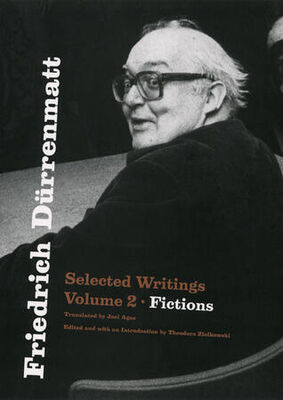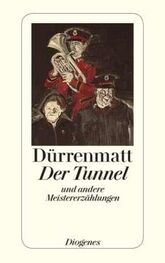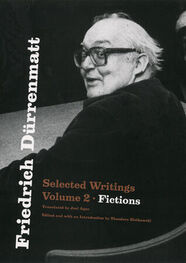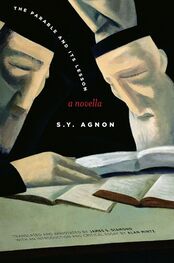” “Nonsense.” The remark came from the man occupied with the problem of the Nimzovich defense, who was annoyed because he was still holding out his ticket without the conductor’s taking any notice. “Nonsense, we are driving through a tunnel. You can see the rock wall clearly. Looks like granite. There are more tunnels in Switzerland than anywhere in the world. I read it in a statistical yearbook.” The conductor, finally taking the chess player’s ticket, assured the passengers again, almost pleadingly, that the train was heading for Zurich, whereupon the twenty-four-year-old demanded to speak to the chief conductor. He was at the front of the train, the conductor said, and besides the train was heading for Zurich, it was six twenty-five now, and in twelve minutes they’d be stopping in Olten, according to the summer schedule; he traveled on this train three times a week, he said. The young man set out toward the front of the train. He found it even harder to walk in the overcrowded train than he had earlier going in the opposite direction. The train must have been running at great speed, for it was making a fearsome thundering noise. He had removed the cotton wads from his ears when he entered the train; now he replaced them. The people he passed behaved calmly. The train was in no way different from other trains he had taken on Sunday afternoons, and he could see no signs of alarm anywhere. In a second-class car, an Englishman stood in the aisle by the window with a radiant smile, tapping his pipe against the glass. “Simplon,” he said. In the dining car, too, everything was normal, even though all the seats were taken and any one of the travelers or the waiters serving cutlets and rice could have noticed the tunnel. The young man found the chief conductor, whom he recognized by his red pouch, at the exit of the dining car. “May I help you?” asked the chief conductor, a tall, calm man with a carefully tended black moustache and rimless eyeglasses. “We have been in a tunnel for the past twenty-five minutes,” said the young man. The chief conductor did not look at the window, as the twenty-four-year-old had expected; he turned to the waiter instead. “Give me a box of Ormond 10,” he said, “I smoke the same brand as this gentleman here.” But that brand of cigars was not available, so the young man, happy to have found a point of contact, offered the chief conductor a Brasil. “Thanks,” said the chief conductor. “I’ll hardly have any time to buy one in Olten, so you’re doing me a big favor. Smoking is important. May I ask you to follow me?” He led the twenty-four-year-old into the baggage car, which was in front of the dining car. “After this comes the engine,” the chief conductor said as they entered the room. “We’re at the head of the train.” A feeble yellow light was shining in the baggage car. The greater part of the car was only vaguely discernible. The side doors were locked, and the darkness outside only penetrated through a small barred window. There were suitcases standing about, many of them with hotel stickers pasted on them, and some bicycles and a baby carriage. The chief conductor hung his red pouch on a hook. “May I help you?” he asked again, without looking at the young man; he began instead to fill out forms in a booklet he had taken from his pouch. “We’ve been in a tunnel since Burgdorf,” replied the twenty-four-year-old with determination. “There is no such tunnel on this line, I know the route, I take it both ways every week.” The chief conductor kept writing. “Sir,” he finally said, stepping up close to the young man, so close that their bodies nearly touched, “sir, there is not much I can tell you. I don’t know how we got into this tunnel, I have no explanation for it. But I ask you to consider that we are moving on tracks. The tunnel therefore must lead somewhere. There is no evidence of there being anything wrong with the tunnel, except of course that it doesn’t end.” The chief conductor, still holding the Ormond Brasil ю between his lips without smoking, had spoken extremely softly, but with such dignity and so clearly and emphatically that his words were audible despite the wads of cotton and even though the roaring sound of the train was many times louder here than in the dining car. “In that case I must ask you to please stop the train,” said the young man impatiently. “I don’t understand a word you’re saying. If something’s not right about this tunnel, the existence of which you yourself can’t explain, then it’s your duty to stop the train.” “Stop the train?” the chief conductor slowly replied. This, he said, had certainly crossed his mind too. Whereupon he closed his booklet and put it back into the red pouch, which was swinging back and forth on its hook. Then he carefully lit his Ormond. “Should I pull the emergency brake?” the young man asked and was about to reach for the brake handle above his head when he lurched forward and banged into the wall. A baby carriage rolled toward him, valises came sliding along, and the chief conductor, too, staggered oddly through the baggage car with his arms stretched out before him. “We’re going downhill,” the chief conductor said, leaning against the front wall of the car next to the twenty-four-year-old man, but the anticipated crash of the hurtling train against a rock wall, the telescoping of jammed, crumpled cars, did not happen. Instead the tunnel appeared to resume a level course. The door at the other end of the car opened. In the glaring light of the dining car they could see people raising glasses to each other; then the door closed again. “Come into the engine room,” the chief conductor said, looking into the twenty-four-year-old man’s face with a pensive and, it suddenly seemed, threatening expression. Then he unlocked the door next to which they were leaning against the wall. A stormlike, hot blast of air struck them with such force that they staggered against the wall. At the same time a terrifying tumult filled the baggage car. “We have to climb over to the engine,” the chief conductor screamed almost inaudibly into the young man’s ear, and disappeared in the rectangle of the open door, through which one could see the brightly lit windowpanes of the locomotive swinging back and forth. The twenty-four-year-old followed with determination, even though he couldn’t see what the sense of this climbing was. He clung to one of the iron railings that were attached to either side of the platform he had stepped on, but the terrifying thing was not the horrendous wind, which abated as the young man approached the engine, but the close proximity of the walls of the tunnel, which he couldn’t see, since he had to fully concentrate on the engine, but which he could sense as he stood there, shaken to his bones by the pounding of the wheels and the whistling of the air. He felt as if he were rocketing with the speed of stars into a world of stone. A narrow ledge ran along the side of the locomotive, and above it an iron railing curved around the length of the engine: This must be the way, he concluded; he would have to risk a leap of about three feet. And so he succeeded in grasping hold of the railing, and inched his way along the ledge, with his body pressed against the locomotive; but this gradual advance did not become truly terrifying until he had reached the side of the engine, where he was now fully exposed to the impact of the roaring hurricane and the menacing walls of stone, which came sweeping in, brightly lit by the engine. It was the chief conductor who saved him by pulling him through a little door into the engine room. Exhausted, the young man leaned against a wall, when all of a sudden it became quiet, for as soon as the chief conductor shut the door, the steel plates of the giant locomotive muted the racket so that it could hardly be heard. “We lost the Ormond Brasil as well,” said the chief conductor. “It wasn’t smart to light one before all that climbing, but they break easily if you don’t have a box with you, on account of their length.” After the perilous proximity of the stone walls, the young man was glad to be distracted by something that reminded him of his ordinary life less than half an hour ago, of those changeless days and years (changeless because he had only been living toward the moment at which he had now arrived, this moment of caving in, of the earth’s surface suddenly giving way, of plunging precipitously to the bowels of the earth). He pulled one of the brown cartons from his right coat pocket and offered the chief conductor another cigar, put one in his own mouth as well, the chief conductor offered a light, and carefully they both drew on the flame. “I think very highly of this Ormond,” the chief conductor said, “but you have to draw hard, otherwise they go out,” words that made the twenty-four-year-old suspicious, because he sensed that the chief conductor didn’t like to think about the tunnel either, which was still continuing outside (it was still conceivable that it would suddenly end, as a dream can suddenly end). “Six forty p.m.,” said the young man after looking at the luminous dial of his watch. “Were supposed to be in Olten by now.” And he thought of the hills and forests that had still been there recently, showered with gold by the setting sun. Thus they stood, smoking, leaning against the wall of the engine room. “Keller’s my name,” the chief conductor said, drawing on his Brasil. Theyoung man did not relent. “All that climbing around the engine was pretty dangerous,” he remarked, “at least for someone like me who isn’t used to it. So I’d like to know why you brought me here.” The chief conductor replied that he didn’t know, that he had only wanted to give himself time to think. “Time to think,” repeated the twenty-four-year-old. “Yes,” said the chief conductor, “that’s it,” and continued smoking. The engine seemed to tilt forward again. “We could go into the engineer’s cabin,” Keller suggested; however, he remained standing irresolutely by the engine wall. Thereupon the young man walked down the aisle. When he opened the door to the engineer’s cabin, he stood still. “Empty,” he said to the chief conductor, who joined him at the door, “the engineer’s cabin is empty.” They entered the room, lurching due to the enormous speed with which the engine dashed further and further into the tunnel, tearing the train along with it. “See for yourself,” said the chief conductor, pressing down several levers. He also pulled the emergency brake, but the engine did not obey. They had done everything to stop it as soon as they had noticed the change in the train’s route, Keller assured him, but the machine had just raced on and on. “It’ll keep on racing,” said the twenty-four-year-old, pointing to the speedometer. “Ninety. Has this engine ever done ninety?” “No more than sixty-five,” replied the chief conductor. “Precisely,” said the young man. “Precisely. The speed is increasing. It’s pointing to a hundred and twelve now. We’re falling.” He stepped up to the window, but was unable to hold himself upright. His face was pressed against the glass, due to the fantastic speed of their descent. “The engineer?” he shouted, staring at the masses of rock that soared upward in the glaring arc lights, zooming toward him and vanishing above and beneath him and on both sides of the engineer’s cabin. “Jumped off,” Keller shouted back. He was sitting on the floor now, leaning against the switchboard. “When?” asked the twenty-four-year-old stubbornly. The chief conductor hesitated a little and had to light another Ormond, his legs level with his head, since the train was tilting more and more steeply. “Five minutes after it started,” he said then. “A rescue was out of the question by then. The man in the baggage room jumped off too.” “And you?” asked the twenty-four-year-old. “I’m the chief conductor. Besides, I have always lived without hope.” “Without hope,” repeated the young man, who now lay snug against the glass pane of the engineer’s cabin, his face pressed over the abyss. “We were still sitting in our compartments and had no idea it was all over,” he thought. “It seemed as if nothing had changed yet, but actually the shaft leading down had already swallowed us up.” “1 have to go back,” the chief conductor shouted now, “they’re probably panicking in the cars, trying to climb back as far as possible.” “I’m sure,” replied the twenty-four-year-old man, thinking of the fat chess player and the girl with the novel and the red hair. He offered the chief conductor his remaining cartons of Ormond Brasil 10. “Take them,” he said, “you’ll just lose your Brasil again while climbing back.” “Aren’t you coming along?” the chief conductor asked. He had raised himself up and with a great effort began to crawl up the funnel of the aisle. The young man looked at the meaningless instruments, at the ridiculous levers and switches surrounding him in the glaring light of the cabin. “A hundred and thirty,” he said. “I don’t think you’ll be able to reach the cars above us at this speed.""It’s my duty,” the chief conductor shouted. “Certainly,” the twenty-four-year-old man replied, without looking back to witness the chief conductor’s senseless undertaking. “I must at least try,” shouted the chief conductor, who had climbed to the far end of the car by now, pressing his thighs and elbows against the metal walls for support, but as the locomotive tilted down further, plunging straight toward the earth’s core with terrifying speed, so that the chief conductor found himself dangling directly over the twenty-four-year-old, who was lying face down at the bottom of the engine on the silver window of the engineer’s cabin, his strength gave way. The chief conductor dropped and fell onto the switchboard. There he lay, bleeding profusely, next to the young man, gripping his shoulders. “What shall we do?” the chief conductor shouted once more into the young man’s ear through the echoing roar of the walls hurtling toward them, while the young man, his fat body useless and no longer a protection, lay glued to the window of the engineer’s cabin, sucking in the abyss with his eyes, which he had opened wide for the first time. “What shall we do?” screamed the chief conductor again; to which, without turning his face from the spectacle as the two wads of cotton were blown upward with arrowlike swiftness by the monstrous draught that burst in of a sudden, the twenty-four-year-old replied with spectral serenity: “Nothing."






